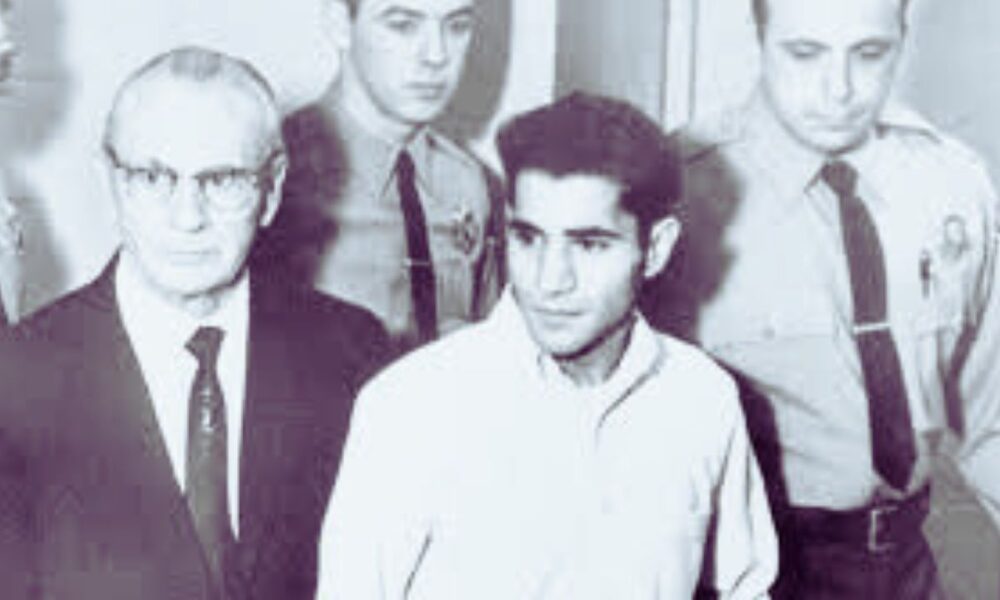A newly declassified CIA personality assessment of Sirhan Sirhan expresses frank disbelief that the man convicted of killing Robert F. Kennedy was capable of carrying out the crime.
The personality profile, drafted shortly after Kennedy’s 1968 assassination and released Thursday under President Donald Trump’s sweeping declassification order, details Sirhan’s behavior, emotional patterns, and inner world in the days following the shooting.
The anonymous author or authors—writing collectively as “we”—painted a portrait of a disturbed but directionless individual, someone impulsive and intuitive but ultimately “very unlikely” to have acted under precise instructions.
“We doubt that we can describe his ‘illness’ really satisfactorily,” the assessment states. “Had we seen his handwriting before he assassinated Senator Kennedy, we would have described him as [redacted]. However, under no circumstances would we have predicted that he was ‘capable’ of doing what he did.”
The assessment—which includes analysis of Sirhan’s handwriting, diary entries, and doodles—suggests that his attack was less the product of a calculated political plot than the kind of unpredictable outburst more common in domestic violence.
“Most people of this type attack their mother or their girlfriend,” the profile concludes. “Occasionally they will lash out against an employer or colleagues … Sometimes they will pick public figures and make abortive attempts to get at them.”
In the final lines of the report, handwritten annotations clarify the authors’ comparison: Sirhan, they claim, was more like the “impulsive” assassins of Presidents Garfield and McKinley, not the “calculating” killers of Lincoln and JFK.
One of the more striking revelations from the document is the analysts’ insistence that Sirhan would have been entirely ineffective as part of a conspiracy. “Obviously, we cannot see him as part of a conspiracy,” they write. “He could be a tool of a conspiracy … It is very unlikely however that he could have effectively acted under precise instructions.”
Though the authors cite historical examples—like George Atzerodt, an inept accomplice in the Lincoln assassination plot—they ultimately conclude that Sirhan’s mental makeup made him ill-suited to orchestrated violence.
The document bears no signature, and it’s unclear whether the analysis was written by a single CIA official or a team. The use of “we” could indicate a group, or it may be the academic “we” sometimes used by individual analysts.
A separate psychological profile dated June 12, 1968 — nearly a week after Kennedy died—echoes the view that Sirhan had significant but undirected mental capacity. It describes him as having “high intellectual potential” but that this was “not properly utilized, due to severe [redacted].”
Elsewhere, the psychological report observes: “[He] learns and understands quickly, but only what fits into his personal frame of reference. Then he is able to inform himself well. The same goes for his astute gift of observation; notices only what he wants to see and how he wants to see it.”
The emotional evaluation portion of the document is almost entirely redacted, with white tape covering large swaths of text. No explanation for the redactions is provided.
These newly released records arrive amid renewed scrutiny of the Kennedy assassination. President Donald Trump—currently serving his second non-consecutive term—ordered the declassification of remaining government files related to the assassinations of John F. Kennedy, Robert F. Kennedy, and Martin Luther King Jr.
The RFK tranche released Thursday is the first major disclosure under that directive.
As The Dallas Express previously reported, the CIA claims it had no prior interest in Sirhan before the June 5, 1968, shooting, asserting in a 1975 internal memo that Sirhan “had never been of interest to the Agency.”
That memo details how the CIA gathered background information in the hours and days following the assassination and shared it discreetly with the Los Angeles Police Department. According to the memo, the arrangement was never made public.
The agency maintains it found no links between Sirhan and any known terrorist group. But doubts linger, in part because of forensic anomalies raised by critics over the years.
Robert F. Kennedy Jr., now Secretary of Health and Human Services, has repeatedly claimed that Sirhan did not fire the fatal shots that killed his father.
In a 2021 op-ed, Kennedy Jr. pointed to discrepancies between autopsy evidence and witness testimony, suggesting that the fatal shots came from behind, while Sirhan was in front of his father. He instead implicated Thane Eugene Cesar, a security guard with alleged ties to defense contractors and—according to researcher Lisa Pease—possible connections to the CIA.
Sirhan, now 81, maintains he has no memory of the shooting. His handwritten notes, including one line stating, “My determination to remove RFK is becoming more and more of an unshakeable obsession,” have been cited by many as evidence of premeditation. Still, the CIA’s internal records suggest that those closest to the case could not reconcile the act with the man.
“The odds against him being successful were tremendous,” the CIA assessment concludes.
The full scope of Sirhan’s motives—and whether he acted alone—remains as unsettled in 2025 as it was in 1968. But with each new disclosure, the picture becomes more complicated, not less.


